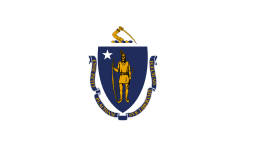Camp Wightman
Camp Wightman is a former American Civil War training camp that existed from 1861 to 1864 on Long Island in Boston Harbor.[1]
History
In 1860, control of the Long Island Company was transferred to Thomas J. Dunbar of Boston. The plan to develop this island was thwarted by the rumors of war and plans for military installations on Long Island Head and other parts of the island. Camp Wightman was established on Long Island. The Commander was General Devens who used the Long Island House as his headquarters building. This military post was named after Mayor Wightman of Boston. On April 17, 1861, the 3rd Massachusetts Regiment departed Long Island along with the 4th Massachusetts Regiment, sailing to Fort Monroe, Virginia. These famous regiments were credited with destroying the navy yard at Norfolk, Virginia, and fought the Virginians at Hampton. On their return from the South, the 3rd Massachusetts Regiments were mustered out after four days in camp here. The men of the 4th Massachusetts Regiment were the first northern troops to march on Virginia soil during the Civil War. They also fought at Big Bethel. The 4th Massachusetts Regiment was also mustered out at Camp Wightman on Long Island.
During April and May 1861, Thomas Cass, formerly commander of the Massachusetts militia organization known as the Columbian Artillery, recruited the 9th Massachusetts Regiment. This regiment was composed almost totally of Irishmen. Cass became the first regimental Colonel. The 9th Massachusetts Regiment was conscripted from Salem, Marlboro, and Stoughton. The regiment arrived at Camp Wightman aboard the "Nellie Baker" on May 12, 1861 as part of the 13th Massachusetts Infantry. Training was completed through May and part of June. On June 11, there were mustered into the U.S. Army as the 9th Massachusetts Regiment. Company A was known as the "Columbian Guards." Company B took the name of the "Otis Guards," named after Mrs. Harrison Gray Otis. Company C was called the "Douglas Guards," after Stephen A. Douglas of Illinois. Later, this company became known as the "Meager Guards" taking the name of General Thomas Francis Meager of the Army of the Republic, an Irish orator. Company E was called the "Cass Light Guards" after Colonel Thomas Cass. Company F was named the "Fitzgerald Guards" after the Irish Patriot, Lord Edward Fitzgerald. Company G was from Marlboro and took the name, "Wolftone Guards" after Theobald Wolfe Tone. H Company was the "Davis Guards" from Milford, named after the Irish poet, Thomas Osburn Davis. Company I was called the "McClellan Guards" after General McClellan. Company K was called the "Stoughton Guards" after the town from which they were recruited. The Regiment's Motto was "Gentle when stroked, fierce when provoked." On June 25, 1861, the 9th Regiment sailed to Washington, D.C. from Long Island on the steamers "Ben De Ford", "Cambridge" and "Pembroke." Lieutenant Colonel Patrick Guiney became second in command to Cass.
On May 9, 1862, in its first open field battle, the 9th Regiment made a decisive charge in the Battle of Hanover Court House where it won the title, "The Fighting 9th." This regiment also fought at Gaines Mill on June 27 and at Malvern Hill on July 1 where it lost 111 officers and men. Colonel Cass was mortally wounded and died eleven days later in Boston. Because of its high losses, the 9th was held in reserve at Second Bull Run, Battle of Antietam, and Fredericksburg. It was back in action at Chancellorsville and Gettysburg during the summer of 1863.
In 1863, Camp Wightman had over 1,000 recruits in addition to several full batteries of heavy artillery under the command of General Devens. The military reservation was located on the slope between the Portuguese Village near the southeast beach and the summit beyond the Long Island House. The steamer "Bellingham" was the conscript boat for Fort Wightman on Long Island.
Many deserters drowned in the waters around Long Island as U.S. Army recruits tried to get to the mainland. At the time, it was the custom to induct and train recruits on islands to minimize desertions. A major scam at the time was for a man to sign up for the Army and collect an enlistment bonus. Then, after going AWOL, he would sign up again in another town, collecting an additional bonus. Islands, especially, during the winter months, contained the recruits with the surrounding frigid seawater. Winters in Boston Harbor were so cold that men walking guard duty had to be relieved every thirty minutes to avoid frostbite.
During May 1864, the Fighting 9th Massachusetts Regiment fought in the Wilderness Campaign.
References
- ↑ "Massachusetts". American Forts Network. Retrieved 6 October 2013.
